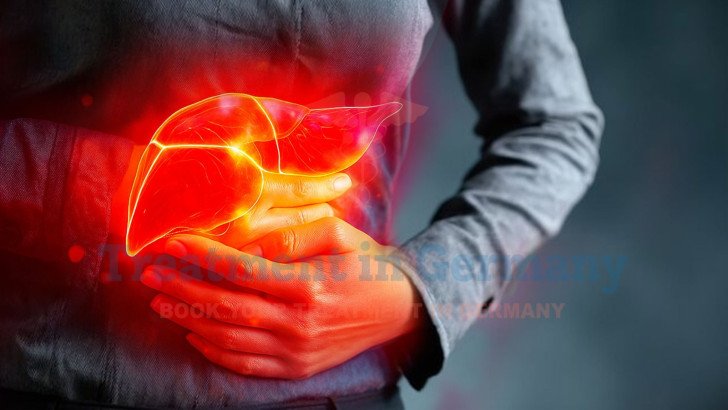
Ascites in liver cancer is a sign of disease progression that requires expert management. Learn why international patients trust German healthcare centers for advanced diagnosis and treatment in Germany.
Ascites, or the accumulation of fluid in the abdominal cavity, is one of the most significant indicators of advanced liver cancer in Germany. This condition not only causes physical discomfort but also provides critical diagnostic information about the progression of liver cancer. For many patients, particularly those with chronic liver disease, ascites signifies a turning point in their cancer journey that requires expert evaluation and multidisciplinary management.
For international patients, receiving timely diagnosis and treatment in Germany has become a preferred option. Renowned German healthcare centers combine medical excellence, advanced imaging technologies, and personalized patient care to manage complex cases like cancer-related ascites effectively.
Ascites refers to the abnormal buildup of free fluid in the peritoneal cavity that surrounds the abdominal organs. In liver cancer, ascites typically develops because the tumor obstructs normal blood flow through the liver, causing portal hypertension. This condition increases venous pressure and pushes fluid into the abdomen.
Several factors contribute to ascites formation in advanced liver cancer, including:
The presence of ascites often signals advanced disease and requires immediate medical attention. In Germany, early evaluation by hepatology and oncology specialists ensures accurate diagnosis and tailored management.
Ascites formation in liver cancer is primarily linked to three major processes:
This complex interplay results in noticeable swelling, discomfort, and other advanced liver cancer symptoms, which require specialized imaging and laboratory testing for accurate assessment.
Symptoms of Cancer-Related Ascites
Patients with cancer-related ascites often experience the following symptoms:
These symptoms can develop gradually or rapidly, depending on the progression of the underlying cancer. International patients receiving Ascites treatment in Germany benefit from rapid assessment and intervention to relieve discomfort and control the cause.
Diagnosis of Ascites in Germany
German healthcare centers follow a structured, evidence-based approach to diagnosing and managing ascites in liver cancer. Diagnostic methods include:
Laboratory evaluation of the fluid determines whether the ascites is malignant or non-malignant. This information helps physicians create an individualized treatment plan tailored to each patient’s condition.
Impact of Ascites on Liver Cancer Staging
The detection of ascites significantly influences the staging of liver cancer. In most classification systems, malignant ascites indicates stage IV disease, reflecting advanced progression and possibly peritoneal involvement. Even non-malignant ascites can signal severe liver dysfunction or vascular obstruction.
In Germany, staging is conducted by interdisciplinary tumor boards that include best hepatologists, best oncologists in Germany, and best radiologists. This collaborative approach ensures that each patient receives the most precise diagnosis and the most effective treatment plan possible.
Treatment and Management of Ascites in Liver Cancer
German healthcare centers provide all these treatments under the supervision of experienced specialists who ensure that care remains patient-centered, effective, and technologically advanced.
Why International Patients Choose Germany
Hospitals in Germany offer integrated medical services that include hepatology, oncology, radiology, and palliative care. This ensures that patients with advanced liver cancer symptoms and ascites receive coordinated treatment from specialists in every discipline.
Cutting-Edge Diagnostic Technology
Germany is a world leader in medical imaging and laboratory diagnostics, offering unparalleled precision in evaluating cancer-related ascites.
Seamless International Patient Services
Treatment in Germany (TIG) provides seamless coordination and complete logistic arrangements for patients, including travel, lodging, and medical visa support (if needed). The service, accessible through www.treatmentingermany.de, these services simplify access to high-quality medical treatment for international patients.
Focus on Quality of Life
Beyond cancer treatment, German healthcare centers prioritize symptom relief, nutrition management, and psychological support, enhancing patients’ comfort and emotional wellbeing.
Prognosis and Outlook
While the presence of ascites indicates advanced disease, timely management can significantly improve patient comfort and extend survival. Modern treatments in Germany not only target the cancer itself but also improve the quality of life through integrated care and support.
International patients seeking Ascites treatment in Germany benefit from a holistic approach that combines advanced medical science with compassionate treatment. Early diagnosis and consistent follow-up remain key to optimizing outcomes.
🌍Why Patients Worldwide Prefer Our Medical Services in Germany – Key Benefits Explained:
Frequently Asked Questions (FAQs)
1. What causes ascites in liver cancer?
Ascites occurs when liver tumors block normal blood flow or spread to the abdominal lining, leading to fluid buildup.
2. Does ascites always mean the cancer has spread?
Not necessarily. It can also result from liver dysfunction or portal hypertension, but malignant ascites typically indicates advanced disease.
3. How do German hospitals diagnose ascites?
They use a combination of ultrasound, CT, MRI, and paracentesis to determine the cause and severity of fluid accumulation.
4. Can ascites be cured?
While ascites may not be fully curable in advanced liver cancer, it can be effectively managed to relieve symptoms and improve quality of life.
5. Why choose Germany for liver cancer treatment?
German healthcare centers provide advanced diagnostic tools, cutting-edge therapies, and full support services for international patients, ensuring high treatment success rates and exceptional patient care.
How is ascites managed in advanced liver cancer?
Management includes therapeutic paracentesis, diuretics, nutritional support, and symptom-directed care.
Do international patients have access to these services?
Yes. TIG (Treatment in Germany) at www.treatmentingermany.de helps international patients with complete logistical arrangements.
Kindly complete the form below, and our dedicated team will reach out to you promptly. We look forward to connecting with you soon!
Trierer Straße, 56072 Koblenz, Germany

.webp)
 (1).webp)

.webp)
 (1).webp)


.webp)
 (1).webp)

.webp)
 (1).webp)
